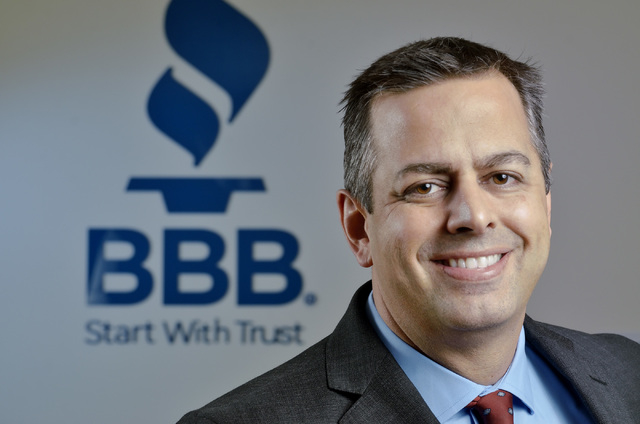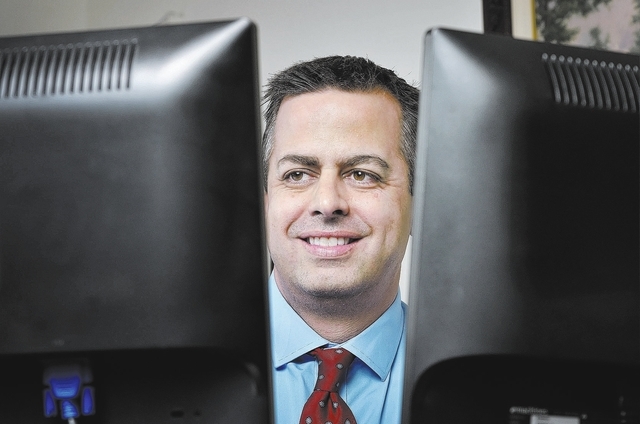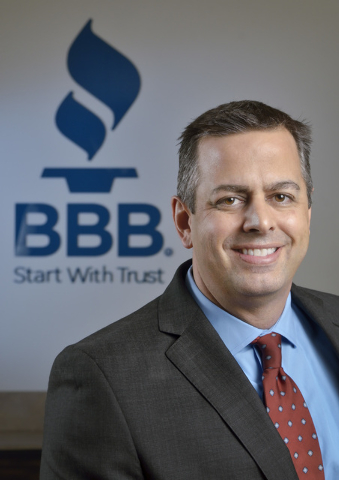Boss touts bureau’s benefits beyond beefs
The Better Business Bureau has been known for decades as an agency consumers can complain to about shoddy products or services. But the bureau’s other offerings mostly remain a mystery to the public, and George Cartwright aims to change that.
Cartwright, who became CEO of the bureau’s local chapter in July 2012, wants the public to know, for example, that the bureau is a self-funded nonprofit corporation and not a government agency. This is why in early October, amid a lengthy online list of purchasing tips and scam warnings, the Better Business Bureau of Southern Nevada announced it would remain open despite the federal government shutdown.
“Operationally, the company runs really well,” he said. “I have longtime, trusted employees (who) are really good at what they do. From a growth-and-vision perspective, as we have entered into new times, that’s really where the weakness and the opportunity lies.”
(Las Vegas Review-Journal Publisher Bob Brown is a member of the local chapter’s board of directors.)
Some weaknesses were exposed during the recession as companies pared or eliminated memberships and subscriptions that seemed like low-cost marketing during the previous decade’s boom. The local bureau chapter’s annual budget, now around $1 million, still has not recovered to the level of six years ago. At 17 workers, the staff is half as large as during the peak.
So Cartwright has emphasized getting out among CEOs and business owners to explain what the bureau does and why members pay dues, based on employee count, that typically run $400 to $1,000 a year but can go much higher for Strip giants.
He’ll use 15 years of business experience gained with the Greenspun companies to carry this out. During his Greenspun days, he worked in land management and evaluated candidates for investments.
Question: This position seems like a major change from your previous experience in real estate and corporate evaluation.
Answer: Greenspun had interests in media, gaming, real estate, publishing. I really think it is that background that prepared me for this opportunity. I have seen industries from A to Z, from the smallest companies to very complex, multimillion-dollar companies.
It was a wonderful chance to use some of the skills I accumulated working for the Greenspun family. The family had a very large private equity arm and they were very entrepreneurial, so they would take a look at almost anything that would make sense financially. As a result, I have seen a lot of different companies and dealt with their growing pains and their struggles.
Question: Did it take a while to get used to the nonprofit environment?
Answer: Yes, it is a different ballgame. The BBB, for the most part, is funded by its accredited businesses that pay dues. We have a responsibility not only to the consumers, who come to us as a trust resource, but also to our accredited businesses, to help them, to represent them. Nobody can just join the BBB. You have to go through a pretty strict series of tests — background, licensing, how you advertise.
Question: What is your hurdle in trying to convince the public and businesses that the BBB still matters?
Answer: The BBB is a hundred-year-old household name brand. With that comes come the challenge of wanting to remain relevant. ... The challenge is how do we successfully educate people on what the BBB does. A lot people think the BBB has just been a place where people go and file a complaint, but that only makes up a small percentage of what we do, a very small percentage. We are advocates not only for consumers but for the businesses as well. We think, by and large, most businesses and most consumers are honest people and we want to help them work together.
Some of the challenges with the brand are connecting with the younger demographic. I’ve had people in their 20s ask, “What is the BBB? What do you do? I’ve never heard of it.”
The challenge to remain relevant is more of a digital push. Everybody goes to the Internet these days. We’re unveiling a new website next month. We’re working on more mobile apps, just to get our name more out there and connected to the younger set.
Question: That’s a full agenda. What are your top priorities?
Answer: Education, brand awareness, exposure. Making sure that our accredited businesses grow because of the services we provide.
Question: Since the word bureau is in the name, what is the governmental tie?
Answer: We receive no federal funding. We are not a governmental agency whatsoever. We don’t have police powers. We are a completely separate nonprofit. When we put out the announcement about not closing during the government shutdown, it was to let people know we are not part of the government. We work closely with governmental agencies, the FBI, the police, the Federal Trade Commission. We are a trusted partner.
Question: The consumer complaint process can take several weeks. How do you compete with websites where people can publish bad reviews about a business instantly?
Answer: For the most part, businesses don’t want to tarnish their reputations. A lot of times, there is just some miscommunication. If we can get them on the phone, we can sometimes settle things in a day or two. But there has to be a written record to make sure everyone is on the same page on the issue.
Just recently, on our site, we’ve started giving people the opportunity not only to lodge a complaint but to say if they had a positive experience. This is the first time in Southern Nevada, and it has been unveiled nationwide, (that website visitors) are going to be able to put in a positive review. We are going to encourage it to remain relevant and balance the scale. And we are always free.
Question: What are your targets for growing the membership base?
Answer: We now have about 2,600 members. There’s no reason we can’t grow 500, 600, 700 members a year. The more we educate and expose the brands, (the more) it’s going to make (boosting) the numbers easier.
Question: What’s the return on investment for business members?
Answer: First and foremost is the power of the brand. Consumers look for that logo. We encourage businesses to use that logo on their websites. In fact, a lot of companies put our logo on their websites when they are not members.
It’s not only the power of the brand and the validation we bring to a company in a consumer’s eyes, but there’s also a whole bunch of other value-adds, such as discounts on life and health insurance, on shipping, a free website landing page, mixers. We are trying to increase the amenity package.
Some people look at the dues and subscriptions line on their (profit and loss statements) and decide to eliminate it. That’s a thing we have to overcome and we work hard every day to overcome. So when businesses call, we can tell them what we’ve seen, the number of inquiries not only on an industry but on each company. So that’s value there. Those people who call to ask are potential customers. When people are looking for things to whack off their budgets, we want to show them that the BBB is, indeed, a very strong value proposition.
Question: There has been a number of reports over the years that the grades businesses get are influenced by whether or not they are members.
Answer: It absolutely does not. The Los Angeles bureau was the subject of a story on “20/20” that really hurt the brand on a national basis. They were trying to prove that BBB had some issues in the way they graded. The council and the brand itself took those claims very, very seriously. There was an investigation to show that we want to adhere to the standards that consumers expect our businesses to adhere to. They (L.A.) were expelled from the system. We wanted to make it perfectly clear that we are not above our accredited businesses. And they were the largest fee-generator (chapter) for the Council of Better Business Bureaus (the umbrella organization) and the system.
Contact reporter Tim O’Reiley at toreiley@reviewjournal.com or at 702-387-5290.































